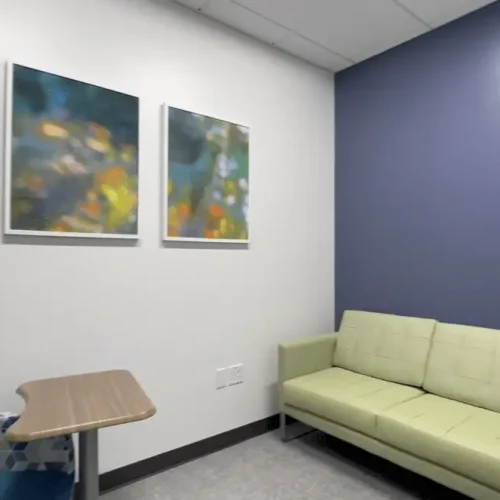Paranoid Personality Disorder Treatment, Counseling, and Therapy Teen Programs in Dallas, Texas
Paranoid Personality Disorder (PPD) is characterized by a persistent pattern of distrust and suspicion toward others, which disrupts daily functioning. Is your teen always on guard, constantly concerned that others are trying to demean, harm, or threaten them? This could indicate paranoid personality disorder. Teen paranoid personality disorder treatment centers in Dallas, Texas, like BasePoint Academy, offer the necessary support.
Our team of personality disorder specialists in Arlington, Forney, and McKinney is dedicated to supporting sound adolescent development and psychological health. Call us for a free assessment that will inform you of an effective treatment plan for teen paranoid personality disorder in Dallas, Texas. In the meantime, this page will provide a brief overview of paranoid personality disorder symptoms and the result-driven mental health treatment methods for addressing this relatively rare condition.
Learning About Teen Paranoid Personality Disorder (PPD)
Teen Paranoid Personality Disorder (PPD) is a mental health condition marked by chronic distrust and suspicion of others, even without justification. Teens coping with paranoid personality disorder often misinterpret intentions, struggle to build trust, and may isolate themselves. Early intervention can be crucial. Seeking professional guidance and personality disorder support tailored to your teen’s needs is advised.
Personality disorders and relationships can be challenging, as individuals with these conditions often struggle with communication, trust, and emotional regulation, affecting their ability to maintain stable, healthy connections. Understanding teen PPD involves examining how their thoughts and feelings affect relationships and daily life. Teens with PPD may perceive neutral actions as threatening, leading to conflict with peers or family. Early intervention with talk therapy and coping strategies can improve their emotional well-being and foster healthier interactions.
Insurance Coverage for Teen Paranoid Personality Disorder
Our complimentary assessment with a licensed clinician will provide you with a recommendation for the appropriate level of care for your teen struggling with paranoid personality disorder. We can also check your insurance coverage levels.
Call us today to schedule a complimentary same-day assessment at (972) 357-1749 or complete our inquiry form.
Teen Paranoid Personality Disorder Treatment Admissions
Contact BasePoint Academy Today
Contact us today to schedule a free confidential assessment for your teen with a licensed clinician.
You can also get in touch to talk with our mental health experts about treatment needs, care options and your insurance coverage levels.
Call: (972) 357-1749Check Your InsuranceParanoid Personality Disorder Causes in Adolescents
The causes of paranoid personality disorder in adolescents are not fully understood but often involve a combination of environmental and biological factors. Emotional instability, early childhood trauma, or exposure to hostile environments may increase the likelihood of a paranoid personality diagnosis. Identifying these influences early can support timely intervention and management.
Adolescents with paranoid personality disorder may also inherit a predisposition from family members with similar disorders. Negative life experiences, such as neglect or abuse, can further shape mistrustful behaviors. Understanding these causes provides a foundation for behavioral health treatment, helping teenagers build resilience and improve their ability to navigate social challenges.
What Are Paranoid Personality Disorder Symptoms and Signs in My Teen Child?
If you’re concerned that your teen may be showing signs of paranoid personality disorder, it’s essential to recognize the key symptoms early. Paranoid personality disorder in teens often manifests as persistent distrust and suspicion of others, which can interfere with daily functioning and relationships. Here are some common symptoms and signs to look for:
- Excessive mistrust – Your teen may consistently suspect that others are out to harm or deceive them, even when no evidence supports these fears. This can lead to difficulties in making or maintaining friendships.
- Reluctance to confide in others – Teens with paranoid personality disorder may refuse to share personal information, fearing it will be used against them. This can result in isolation or strained relationships.
- Reading hidden meanings – Your child might perceive innocent comments or actions as hostile or threatening. This can cause frequent misunderstandings and emotional turmoil in social interactions.
- Quick to anger or respond defensively – Teens with paranoid personality disorder often react strongly to perceived slights, even minor ones, and may respond with anger or resentment. Their defensiveness can make it difficult to communicate openly.
- Difficulty with forgiveness – They may hold grudges and have trouble letting go of perceived offenses, leading to long-lasting resentment.
If you notice these paranoid personality disorder symptoms in your teen, it’s essential to seek mental health treatment. Early intervention can help your teen develop healthier coping mechanisms and improve overall well-being. Are you concerned that your teen needs paranoid personality disorder crisis management? Contact BasePoint Academy today.

What Is a Teen Paranoid Personality Disorder Treatment and Therapy Program?
A teen paranoid personality disorder treatment and therapy program prioritizes helping your child manage symptoms of suspicion, distrust, and emotional instability. These programs often combine individual therapy, group sessions, and family mental health counseling services to address the specific challenges of this condition.
Day treatment programs, for example, offer a structured environment during the day, allowing adolescents to receive intensive therapy while returning home in the evenings. This setup can be especially beneficial if your child needs consistent support but doesn’t require full-time inpatient care. Partial Hospitalization Programs (PHPs) are also a form of day treatment. They differ in their time commitment, offering the intensive support found in a residential treatment facility without requiring overnight stays.
Several treatment centers, including BasePoint Academy, specialize in paranoid personality disorder therapy in Dallas, Texas. They offer individualized programs emphasizing improving symptoms related to paranoid personality disorder and emotional regulation. Our holistic therapy programs utilize evidence-based therapies like Cognitive Behavioral Therapy (CBT) and Dialectical Behavior Therapy (DBT) to help teens develop healthier coping mechanisms and improve relationships with others. If you’re considering therapy for your teen, finding a program that meets their unique needs and provides the right level of care for their situation is essential.
Treatment Programs for Adolescent Paranoid Personality Disorder in Dallas, Texas
If your teen has received a paranoid personality diagnosis, seeking an effective treatment program is a crucial step toward paranoid personality disorder recovery. These programs help adolescents understand their condition and build healthier coping skills to thrive. Treatment for teen paranoid personality disorder in Dallas, Texas, offers a range of programs, including the following.
Paranoid Personality Disorder Outpatient Program
An outpatient program for paranoid personality disorder offers essential emotional support therapy for your teen, helping them manage symptoms in a flexible setting. This program provides ongoing individual therapy sessions addressing trust issues, anxiety, and emotional instability while allowing your teen to maintain daily routines. Your teen can build healthier relationships and coping strategies with consistent support.
Paranoid Personality Disorder PHP
A Partial Hospitalization Program (PHP) for Paranoid Personality Disorder (PPD) provides intensive treatment for your teen, including therapy and, if needed, paranoid personality disorder medication. Medication may be used to address symptoms of anxiety or depression, as there is no pharmacological therapy specifically for PPD.
PHPs offer a comprehensive approach to address the emotional instability and trust issues associated with PPD, all while allowing your teen to return home in the evenings. With expert care, they can develop healthier coping mechanisms and work toward recovery.
Paranoid Personality Disorder IOP
An Intensive Outpatient Program (IOP) for teen paranoid personality disorder treatment offers flexible care while providing a high level of support. Through individual and group therapy, your teen will learn how to manage symptoms, improve interpersonal relationships, and address trust issues in a safe environment. This approach helps them work through emotional challenges while maintaining daily responsibilities.
Paranoid Personality Disorder Residential Program
A residential program for paranoid personality disorder offers an immersive environment to focus on healing. This program provides intensive mental health treatment and therapy. It teaches your teen how to manage intense feelings and cope with paranoid personality disorder trust issues. With 24/7 support, your child will benefit from this structured space for deep personal growth and symptom management.
Therapy and Counseling Options for Teen Paranoid Personality Disorder

When seeking teen paranoid personality disorder therapy in Dallas, Texas, you’ll find several methods that can be tailored to their specific needs. From in-person mental health counseling to teletherapy, various approaches can help manage paranoid personality disorder symptoms and improve emotional regulation. Below are a few examples of available options. Call (972) 357-1749 for more information.
Dialectical Behavior Therapy (DBT)
Dialectical Behavior Therapy (DBT) is a valuable treatment option for teens with paranoid personality disorder, focusing on improving emotional regulation and interpersonal skills. This therapy helps your teen develop coping strategies to manage intense emotions and reduce impulsive behaviors while also teaching mindfulness and distress tolerance.
Mindfulness-Based Cognitive Therapy (MBCT)
MBCT combines mindfulness practices with cognitive therapy techniques to help your teen manage paranoid personality disorder symptoms. By teaching your teen to stay present and observe their thoughts without judgment, MBCT can reduce anxiety, enhance emotional regulation, and promote healthier thinking patterns. This therapy encourages self-awareness, which can be a powerful tool in managing paranoid thoughts and improving overall well-being.
Mindfulness-Based Therapy
Mindfulness-based therapy helps your teen stay focused on the present moment without getting overwhelmed by negative or paranoid thoughts. Through practices such as breathing exercises, meditation, and body awareness, this therapy encourages emotional regulation and reduces anxiety. It promotes self-awareness and teaches skills to manage distressing thoughts in a healthier, more balanced way.
Schema-Focused Therapy
Schema-focused therapy helps your teen identify and change deeply ingrained patterns of thinking, feeling, and behaving that can contribute to paranoid personality disorder. This approach targets negative beliefs, helping your teen understand how these patterns developed and how they can be modified. By addressing these underlying issues, this approach supports your teen in building healthier relationships and improving emotional instability.
Transference-Focused Psychotherapy (TFP)
TFP explores the emotions and behaviors teens bring into relationships, particularly with therapists. By focusing on the relationship between your teen and the therapist, TFP helps uncover patterns that may contribute to Paranoid Personality Disorder (PPD). This therapy aims to improve emotional regulation and interpersonal dynamics, helping your teen develop healthier ways of relating to others.
Cognitive Behavioral Therapy (CBT)
CBT is a highly effective treatment for paranoid personality disorder, helping your teen identify and challenge negative thought patterns. By addressing distorted beliefs and unhealthy behaviors, CBT encourages healthier thinking and coping, leading to improved emotional regulation and interpersonal relationships.
Psychoanalytic or Psychodynamic Therapy
Psychoanalytic or psychodynamic therapy helps your teen explore past experiences, unresolved conflicts, and unconscious patterns contributing to their current behaviors. This therapeutic approach fosters self-awareness, allowing your teen to understand the root causes of their paranoia. It can develop more balanced and adaptive ways of relating to others.
Support and Group Therapy
Support and group therapy provide a safe space for your teen to share their experiences with others facing similar challenges. They can develop social skills, learn from peers, and receive emotional support in groups. Group therapy and family support for paranoid personality disorder foster connection and understanding, promoting belonging and encouraging healthier family dynamics.
BasePoint Academy Accepts health Insurance
We accept most major health insurance providers in Texas and can check your treatment coverage levels on your behalf.
How to Find a Teen Paranoid Personality Disorder and Treatment Program Near Me
BasePoint Academy’s multiple teen paranoid personality disorder treatment centers in Dallas, Texas, nurture emotional development, build self-awareness, and strengthen interpersonal relationships. We are committed to helping adolescents gain the skills and confidence to manage their emotions effectively and create lasting, positive connections.
- Arlington, Texas: 3900 Arlington Highlands Blvd, Suite 237, Arlington, TX 76018
- Forney, Texas: 713 W Broad St, Suite 200, Forney, TX 75126
- Frisco, Texas: 8275 Judges Way, Suite 100I, Frisco, TX 75036
- McKinney, Texas: 4733 Medical Center Drive, McKinney, TX 75069

Teen PPD Treatment Program in Arlington, Texas
Arlington, Texas, between Dallas and Fort Worth, is known for its thriving business, education, and entertainment scene. As the seventh-largest city in the Lone Star State, Arlington is home to the University of Texas at Arlington, the Dallas Cowboys, and the Texas Rangers. For teens struggling with paranoid personality disorder, Arlington offers access to specialized treatment programs.
- BasePoint Academy – Arlington, Texas: 3900 Arlington Highlands Blvd, Suite 237, Arlington, TX 76018, United States
Teen PPD Treatment Program in Forney, Texas
Forney, Texas, twenty miles east of Dallas in Kaufman County, is a growing city that combines small-town charm with modern amenities. Part of the Dallas–Fort Worth metroplex, Forney offers a supportive community for families seeking mental health care. Teens dealing with Paranoid Personality Disorder (PPD) can access specialized treatment programs that enhance emotional regulation and interpersonal skills.
- BasePoint Academy – Forney, Texas: 713 W Broad St, Suite 200, Forney, TX 75126, United States
Teen PPD Treatment Program in McKinney, Texas
About thirty miles north of Dallas in Collin County, McKinney is a vibrant, growing city known for its community spirit and family-friendly atmosphere. As part of the Dallas–Fort Worth Metroplex, McKinney offers access to advanced mental health resources. Teens with paranoid personality disorder can benefit from targeted treatment programs here, focusing on emotional stability and building healthier relationships.
- BasePoint Academy – McKinney, Texas: 4733 Medical Center Drive, McKinney, TX 75069, United States
Alternative Ways to Find Teen Paranoid Personality Disorder Treatment in Dallas, Texas
Finding treatment for teen paranoid personality disorder in Dallas, Texas, can feel overwhelming, but there are practical steps you can take to locate quality care. Start by researching online for local centers specializing in teen mental health treatment, using keywords like “Teen paranoid personality disorder treatment centers in Dallas, Texas.” Pay attention to facilities offering tailored programs for adolescents.
Verify that the treatment centers you’re considering are accredited and staffed by licensed professionals. For example, BasePoint Academy boasts accreditation and recognition from renowned organizations like The Joint Commission, signifying our dedication to exceptional, high-quality care and ethical standards.
Evaluate the treatment programs, including whether they offer outpatient or day treatment options and evidence-based approaches like Dialectical Behavior Therapy (DBT). Review your insurance coverage to confirm potential costs and consider visiting facilities to assess their environment and accessibility for your teen’s needs. You can also check peruse mental health directories and review websites like Yelp and the Better Business Bureau. When in doubt, reach out to us at BasePoint Academy. We’re affiliated with many mental health treatment centers and organizations in Texas and can guide you in finding the most appropriate care for your child.
What Is the BasePoint Difference?

7am to 7pm CST
7 Days a Week

Full Time Physican
On Site

We Transport
To and From

Therapy Involving
the Whole Family

Family
Owned

Contact BasePoint Academy Today
Contact us today to schedule a free confidential assessment for your teen with a licensed clinician.
You can also get in touch to talk with our mental health experts about treatment needs, care options and your insurance coverage levels.
Call: (972) 357-1749Check Your InsuranceDoes Health Insurance Cover Treatment and Therapy for Teen Paranoid Personality Disorder in the Dallas Metroplex?
Yes. Many health insurance plans cover treatment for teen paranoid personality disorder in Dallas, Texas. Coverage may vary depending on your plan, but it can include outpatient therapy, inpatient care, and specialized programs tailored to your teen’s needs. It’s essential to confirm the specifics of your benefits to understand what services are covered.
To ensure your teen receives the necessary treatment for paranoid personality disorder, contact us to check your insurance details. We can clarify which programs and therapies are covered under your plan, including any associated out-of-pocket expenses you might be responsible for, such as copayments.

Which Behavioral Health Insurance Providers Cover Paranoid Personality Disorder Treatment for Teens in Texas?
Several major behavioral health insurance providers in Texas cover treatment for paranoid personality disorder in teens. Some of the top providers include Blue Cross Blue Shield of Texas, UnitedHealthcare, Cigna, Optum, Aetna, and Magellan. These companies often offer plans that include outpatient therapy, inpatient care, specialized treatment programs, and more tailored to your teen’s unique needs.
It’s important to check your policy’s details to ensure that the treatment of paranoid personality disorder is included. Contacting your insurer or teen paranoid personality disorder treatment centers in Dallas, Texas, like BasePoint Academy, can help you confirm these details.
How Much Does Paranoid Personality Disorder Treatment Cost Without Health Insurance Coverage in Texas?
The cost of treatment for Paranoid Personality Disorder (PPD) without health insurance in Texas can vary widely depending on the type of care. Outpatient therapy sessions may range from $100 to $250, while more intensive options like Partial Hospitalization Programs (PHPs) or residential treatment can cost thousands of dollars per month.
Costs depend on factors like the program’s location, the expertise of the clinicians, and additional services provided, such as paranoid personality disorder medication. Many treatment centers offer flexible payment plans or sliding-scale fees to help make care more accessible. If affordability is a concern, consider discussing payment options with BasePoint Academy. We’re committed to facilitating accessible mental health treatment for Texas youth.
How Much Does a Paranoid Personality Disorder Treatment Program Cost with Health Insurance Assistance?
With health insurance assistance, the cost of a teen paranoid personality disorder treatment program in Texas can significantly decrease. Many insurance plans cover therapy sessions, outpatient programs, or even Partial Hospitalization Programs (PHPs). Depending on your insurer and particular plan, you may only need to consider copayments, deductibles, a percentage of the total cost, or coinsurance.
The exact expense will vary considerably. You must check your coverage details to understand which treatments are included and what out-of-pocket costs to expect. Many treatment centers, including BasePoint Academy, can assist with insurance verification to ensure you maximize your benefits while accessing quality care. Call (972) 357-1749.
Contact BasePoint Academy Today
Contact us today to schedule a free confidential assessment for your teen with a licensed clinician.
You can also get in touch to talk with our mental health experts about treatment needs, care options and your insurance coverage levels.
Call: (972) 357-1749Check Your InsuranceWhat Is the Admissions Process at BasePoint’s Paranoid Personality Disorder Therapy Program?
The admissions process for BasePoint’s Paranoid Personality Disorder (PPD) therapy program aims to provide seamless support, ensuring teens receive the most effective care for their needs. Every step is tailored to foster understanding, comfort, and preparation for treatment, guiding families like yours through what can otherwise feel like an overwhelming journey.
The process begins with initial contact, where you’ll reach out via phone or online to discuss your teen’s challenges and ask questions about our programs. From there, an assessment is scheduled, during which licensed mental health professionals carefully review your child’s symptoms, medical history, and unique circumstances to confirm a diagnosis and establish a foundation for care. Next, insurance verification and coverage are handled, ensuring transparency about treatment costs and confirming benefits for your family.
Once the administrative details are complete, treatment plan development takes place. During this step, therapists and clinicians create a personalized roadmap for therapy, addressing your teen’s specific needs and goals. Admissions coordination follows, streamlining paperwork and scheduling the program’s start date. Your family and teen are then introduced to the program through a thorough orientation and program introduction. We’ll explain the therapeutic approaches, structure, and expectations.
Upon enrollment, your teen will begin active participation in treatment, engaging in therapeutic modalities to improve emotional regulation, reduce paranoid tendencies, and build healthier coping skills. As the program progresses, progress monitoring and adjustments ensure effective treatment, with clinicians regularly evaluating your teen’s growth and modifying strategies as needed. We’re committed to providing compassionate, individualized care for your teen and your family throughout the process.
Free and Confidential Paranoid Personality Disorder Assessment and Evaluation for My Teen Child in Dallas
If you’re concerned that your teen may be showing signs of Paranoid Personality Disorder (PPD), seeking a professional evaluation is a crucial first step. We understand how challenging it can be to navigate mental health concerns, which is why we offer free, confidential assessments specifically designed to identify PPD and provide guidance on the next steps for your child’s care.
Our complimentary evaluations are conducted by experienced mental health professionals prioritizing teenage well-being and privacy. Through this process, we can help determine whether symptoms align with PPD and recommend suitable treatment options tailored to their needs. This step can provide you with peace of mind and the resources to support your teen’s emotional health effectively.

Contact The BasePoint Academy Today!
Has your teen exhibited paranoid personality disorder symptoms? If you are concerned about your teenager’s mental health, contact BasePoint Academy for an assessment and a treatment plan for your teen.
Sources
- World Health Organization. (n.d.). Mental health of adolescents. World Health Organization. Retrieved from https://www.who.int/news-room/fact-sheets/detail/adolescent-mental-health on July 11, 2023
- Horowitz, J. M. (2019, February 20). Most U.S. teens see anxiety and depression as a major problem among their peers. Pew Research Center’s Social & Demographic Trends Project. Retrieved from https://www.pewresearch.org/social-trends/2019/02/20/most-u-s-teens-see-anxiety-and-depression-as-a-major-problem-among-their-peers/ on July 11, 2023
Statistics and Info on Paranoid Personality Disorder Among Teens for Texas Families
- Paranoid personality disorder is estimated to affect 1.21% to 4.4% of adults in the U.S. People with this disorder are at an increased risk of developing depression, substance abuse issues, and agoraphobia.
- The distrust and paranoia inherent in paranoid personality disorder often hinder individuals from trusting their doctors and therapists, making it difficult for healthcare professionals to build a strong therapeutic rapport. This challenge can reduce therapy’s efficacy, as the therapeutic relationship is crucial to successful treatment outcomes.
- Antidepressants, antipsychotics, and anti-anxiety drugs may be prescribed for paranoid personality disorder medications, but they’re not typically sufficient on their own for treating personality disorders. They’re most effective when used alongside psychotherapy.
- In a study involving young patients in mental health services, the results offer a new way to understand paranoia in teenagers as a natural response to the challenging social environments they face. For adolescent girls, this may also involve coming to terms with the reality of sexual harm in their everyday experiences. These findings highlight the nuances of paranoid personality disorder in women.
- Paranoid Personality Disorder (PPD) is found in two to ten percent of psychiatric patients seeking care at outpatient clinics, ten to thirty percent of those in psychiatric inpatient hospitals, and twenty-three percent of individuals in prison populations.
- A 2017 research review in Current Behavioral Neuroscience Reports found that African Americans, Native Americans, and Hispanic Americans are more likely to receive a paranoid personality diagnosis.







